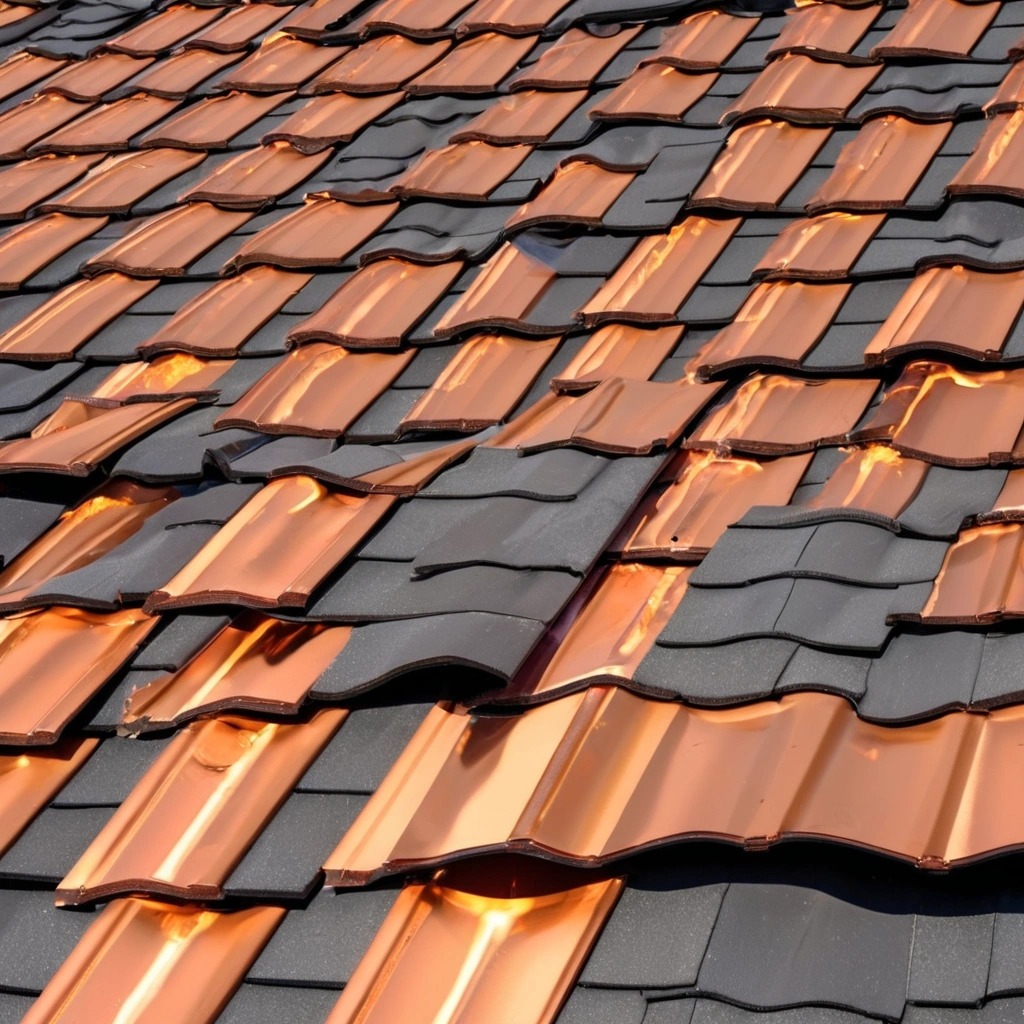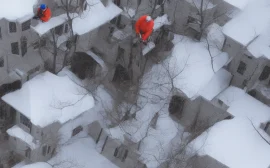Introduction: Protecting Your Denver Home from Wildfire
Denver, a city celebrated for its breathtaking mountain vistas and vibrant neighborhoods, finds itself increasingly vulnerable to the escalating threat of wildfires. The confluence of climate change and expanding urban development necessitates that homeowners in wildfire-prone zones prioritize fire safety, beginning with the critical decision of selecting appropriate roofing materials. The roof, often overlooked, serves as the first line of defense against airborne embers, making the choice of material paramount. Opting for a fire-resistant solution can be the pivotal factor separating a manageable incident from a catastrophic loss, safeguarding not only property but also lives.
This guide offers Denver homeowners a detailed comparison of the top three Class A fire-resistant roofing options, meticulously evaluating cost-effectiveness, aesthetic appeal, expected lifespan, and compliance with local regulations. Investing in fire-resistant roofing is not merely a matter of personal preference; it’s a strategic decision deeply intertwined with Denver’s unique real estate landscape. Properties equipped with Class A fire-rated roofs often command higher resale values, reflecting the growing awareness among buyers regarding wildfire risks. Furthermore, many insurance companies offer reduced premiums for homes with enhanced fire protection measures, translating into long-term financial benefits for homeowners.
Understanding the nuances of Denver roofing options, including concrete tiles, metal roofing (steel, aluminum, and copper), and specially treated asphalt shingles, is essential for making an informed decision that aligns with both safety and investment goals. This guide will also navigate the complexities of Denver building codes and HOA roofing requirements. Navigating the landscape of Denver building codes and HOA roofing requirements is crucial for any homeowner considering roof replacement Denver. Many neighborhoods, particularly those within the Wildland-Urban Interface (WUI), mandate Class A fire-rated roofing materials to mitigate wildfire risks.
Ignoring these regulations can result in costly fines and delays, underscoring the importance of thorough research and compliance. Furthermore, Homeowners Associations (HOAs) often impose additional restrictions on roofing materials, styles, and colors, potentially limiting your choices. Before embarking on a roof replacement project, it’s imperative to consult with both the local building department and your HOA to ensure your selected roofing material meets all applicable requirements. This proactive approach will prevent future complications and ensure a smooth and compliant installation process. We will explore the interplay of these local factors with fire-resistant roofing choices, ensuring a practical guide for Denver homeowners.
Comparing Class A Fire-Resistant Roofing Materials
Class A fire-rated roofing materials stand as the vanguard of wildfire protection, engineered to endure severe fire exposure and prevent flames from penetrating into the structure of your home. In Denver, where the threat of wildfires looms larger in some neighborhoods than others, a comprehensive understanding of these materials is not just advisable, but essential for responsible homeownership. We will delve into the characteristics of concrete tiles, metal roofing (encompassing steel, aluminum, and copper variants), and asphalt shingles fortified with fire-retardant additives, meticulously analyzing their individual strengths, weaknesses, and suitability for the unique demands of the Denver area.
Making an informed decision hinges on weighing these factors against your budget, aesthetic preferences, and neighborhood-specific regulations. Concrete tiles offer a compelling combination of exceptional fire resistance and remarkable longevity, often exceeding 50 years, making them a wise long-term investment for Denver roofing. Their inherent non-combustibility provides superior wildfire protection, a critical advantage in high-risk zones. Furthermore, concrete tiles are available in a diverse array of styles, convincingly mimicking the appearance of traditional clay or slate, allowing homeowners to maintain architectural harmony while enhancing fire safety.
However, the benefits come with caveats: concrete tiles command higher material and installation costs, and their substantial weight may necessitate structural reinforcement, adding to the overall expense. Moreover, Denver’s freeze-thaw cycles can cause cracking if the tiles are not properly installed and maintained. Denver building codes frequently favor, and in some cases mandate, concrete tiles in areas designated as high wildfire risk, reflecting their proven effectiveness. Metal roofing, encompassing options like steel, aluminum, and copper, presents another excellent choice for fire-resistant roofing, boasting lifespans ranging from 40 to 70 years.
Its inherent fire resistance stems from its non-combustible nature, providing a reliable barrier against wildfire embers. Beyond fire safety, metal roofing offers energy efficiency, reflecting sunlight and reducing cooling costs during Denver’s hot summers. Its relatively lightweight nature, compared to concrete, minimizes the need for structural modifications. However, metal roofing also carries potential drawbacks. The initial material costs are typically higher than asphalt shingles, and hail, a common occurrence in Denver, can cause denting, impacting aesthetics.
Noise during rain or hail storms can also be a concern, though this can be mitigated with appropriate underlayment. Different metals offer varying degrees of corrosion resistance; copper stands out as the most resistant but also the most expensive, while steel requires protective coatings to prevent rust. Regular inspection and maintenance are crucial to ensure the longevity and performance of metal roofing systems. Asphalt shingles with fire-retardant additives offer an attractive balance of affordability and fire protection, making them a popular choice for many Denver homeowners seeking roof replacement Denver.
Their primary advantage lies in their lower upfront cost and ease of installation, making them accessible to a wider range of budgets. Available in a vast spectrum of colors and styles, asphalt shingles can complement diverse architectural designs. However, their lifespan, typically ranging from 20 to 30 years, is shorter compared to concrete or metal roofing. While Class A fire-rated asphalt shingles provide a degree of wildfire protection, their fire resistance is generally lower than that of concrete or metal. Furthermore, asphalt shingles are more susceptible to damage from hail and high winds, common weather events in Denver. When selecting asphalt shingles, prioritize those with a UL 790 Class A fire rating and consider options with enhanced wind resistance to withstand Denver’s often-challenging weather conditions. Understanding HOA roofing requirements is also important, as some communities may have specific restrictions on shingle types or colors.
Denver Building Codes, HOA Requirements, and Cost Considerations
Denver’s building codes, particularly in areas designated as Wildland-Urban Interface (WUI), often mandate Class A fire-rated roofing to enhance wildfire protection. These regulations are in place to safeguard homes and communities against the devastating effects of wildfires, which are an increasing concern in the Denver area. Homeowners Associations (HOAs) can also impose specific roofing material requirements, sometimes restricting colors or styles to maintain neighborhood aesthetics. Always check with your local building department and HOA before making a decision about roof replacement Denver.
Ignoring these regulations can lead to fines, legal complications, and the need for costly replacements, potentially derailing your Denver roofing project before it even begins. Understanding these requirements upfront is crucial for a smooth and compliant renovation. Navigating Denver building codes and HOA guidelines might seem daunting, but it’s a critical step in ensuring your home is both beautiful and safe. Cost Comparison: Asphalt shingles with fire-retardant additives are generally the most affordable option for Denver roofing, followed by metal roofing, and then concrete tiles.
Material costs for asphalt range from $3-$5 per square foot, metal from $8-$15 per square foot, and concrete from $10-$20 per square foot. Installation costs vary depending on the complexity of the roof and the contractor, but generally follow the same order. Remember to factor in the cost of removing the old roof and any necessary structural reinforcements. For example, a simple asphalt shingle roof replacement on a 1,500 square foot home might cost between $4,500 and $7,500 for materials alone, while a comparable metal roof could range from $12,000 to $22,500.
Obtaining multiple quotes from reputable Denver roofing contractors is essential for accurate budgeting. Lifespan Estimates: Concrete and metal roofs offer significantly longer lifespans than asphalt shingles, potentially saving money in the long run despite the higher upfront cost. Asphalt shingles typically last 15-25 years, while metal roofs can last 40-70 years or more, and concrete tiles can endure for over 50 years. Consider the long-term value proposition when making your decision. A metal roof, while more expensive initially, could potentially outlast two or even three asphalt shingle roofs, reducing the overall cost of ownership and minimizing the disruption of frequent roof replacements.
This is especially important in Denver’s climate, where extreme weather conditions can accelerate the wear and tear on roofing materials. Aesthetic Considerations: Each material offers a different aesthetic. Asphalt shingles provide a traditional look, while metal roofing offers a more modern, sleek appearance. Concrete tiles can mimic the look of clay or slate, adding a touch of elegance. Choose a material that complements your home’s style and neighborhood aesthetic. Drive around your neighborhood and observe the roofing styles that are prevalent and appealing.
Consider how the chosen material will impact your home’s curb appeal and overall value, especially in the competitive Denver real estate market. A well-chosen roof can significantly enhance your home’s visual appeal and make it stand out. Impact on Home Insurance Premiums: Installing a Class A fire-rated roof can often lead to lower home insurance premiums, as it reduces the risk of fire damage. Check with your insurance provider for specific discounts. Many insurance companies in Denver recognize the increased fire resistance of these materials and offer substantial savings.
Beyond potential insurance savings, a fire-resistant roof provides invaluable peace of mind, knowing that your home is better protected against the threat of wildfires, which is a significant concern for Denver homeowners. Before committing to a roofing material, consult with your insurance agent to understand the potential premium reductions and ensure that the chosen material meets their requirements for discounts. Beyond the direct costs, lifespan, and aesthetics, consider the long-term maintenance requirements of each roofing material.
While metal and concrete roofs boast extended lifespans, they may require specialized maintenance to ensure their longevity. For example, metal roofs may need periodic inspections to address potential corrosion or damage from hail, a common occurrence in Denver. Concrete tiles, while durable, can be susceptible to cracking over time, particularly in areas with freeze-thaw cycles. Understanding these maintenance needs and factoring in the associated costs will provide a more comprehensive picture of the true cost of ownership for each roofing material. Regular maintenance, regardless of the material chosen, is crucial for maximizing the lifespan and performance of your roof.
Maintenance, Environmental Impact, and Neighborhood Factors
Maintenance Needs: All roofing materials demand some level of upkeep, influencing long-term Denver roofing costs. Asphalt shingles, while initially more affordable, may require frequent repairs due to Denver’s intense weather patterns, including hail and high winds, potentially shortening their roofing lifespan. Metal roofs, known for their durability, should be inspected for dents from falling debris and potential corrosion, especially around fasteners; a protective coating can mitigate these issues. Concrete tiles, while highly durable, are susceptible to cracking from significant impacts or freeze-thaw cycles, necessitating periodic checks and repairs.
Regardless of the chosen material, regular gutter cleaning is paramount for all roof types to prevent water damage, which can compromise the roof’s structural integrity and fire resistance, and lead to costly roof replacement Denver. Environmental Impact: The environmental consequences of your roofing selection warrant careful consideration, aligning with growing sustainability concerns in Denver Real Estate. Metal roofing, particularly steel and aluminum, often boasts a high recycled content and is fully recyclable at the end of its service life, reducing landfill waste and embodying circular economy principles.
Concrete tiles can be manufactured using sustainable materials like fly ash, diverting industrial byproducts and lowering the carbon footprint of production. Asphalt shingles, traditionally petroleum-based, present a greater environmental challenge; however, some manufacturers are pioneering recycling programs, diverting shingles from landfills and repurposing them into road paving materials. Choosing lighter-colored roofing options, regardless of material, can also reduce a home’s cooling load, decreasing energy consumption and mitigating the urban heat island effect prevalent in Denver.
Neighborhood-Specific Considerations: In Denver neighborhoods with a heightened wildfire risk, such as those bordering the foothills or open spaces, prioritizing superior fire-resistant roofing is paramount, irrespective of initial roofing costs. Concrete tiles and metal roofing, both boasting a Class A fire rating, provide exceptional wildfire protection, safeguarding homes against ember showers and radiant heat. These materials offer a crucial defense in areas where wildfire spread is a significant concern. Conversely, in areas with a lower assessed wildfire risk, asphalt shingles with fire-retardant additives may offer a sufficient level of protection, balancing cost-effectiveness with adequate safety. However, homeowners should always consult Denver building codes and HOA roofing requirements to ensure compliance and make informed decisions based on their specific location and risk profile. Furthermore, consider the aesthetic cohesion of your roofing choice with the neighborhood’s architectural style, enhancing property values and community harmony.
Conclusion: Making the Right Choice for Your Home
Choosing the right fire-resistant roofing material is a critical decision for Denver homeowners in wildfire-prone areas. It’s not merely about compliance; it’s about safeguarding your largest investment and, more importantly, the lives of your loved ones. By carefully considering the pros and cons of concrete tiles, metal roofing, and asphalt shingles with fire-retardant additives, alongside Denver’s specific building codes, HOA roofing requirements, cost factors, lifespan estimates, aesthetic preferences, and environmental impact, you can make an informed choice that protects your home and family for years to come.
Prioritize safety above all else, develop a realistic budget that accounts for both initial costs and long-term maintenance, and select a material that not only meets fire safety standards but also complements your home’s architectural style and neighborhood character. For example, a modern home in Stapleton might benefit from the clean lines of a metal roof, while a traditional Tudor in Hilltop could be beautifully complemented by concrete tiles. Beyond the immediate safety benefits, selecting a Class A fire-rated roof can also positively impact your Denver real estate value.
Potential buyers are increasingly aware of wildfire risks, and a home with a demonstrably fire-resistant roof is a significant selling point. Furthermore, many insurance companies offer discounts to homeowners who invest in fire-resistant roofing, helping to offset the initial costs. When evaluating roofing costs, consider the long-term value proposition. While asphalt shingles with fire-retardant additives may have a lower upfront price, metal roofing and concrete tiles often boast significantly longer lifespans, reducing the need for roof replacement Denver services in the future.
Don’t underestimate the importance of proper roof maintenance. Regular inspections and prompt repairs can extend the lifespan of any roofing material and ensure its continued fire resistance. Ultimately, the best approach involves a multi-faceted strategy. Start by consulting with experienced Denver roofing contractors who specialize in fire-resistant materials. They can provide personalized advice based on your specific needs, budget, and the characteristics of your property. Obtain multiple quotes and carefully review the contractors’ credentials and insurance coverage. Also, thoroughly research Denver building codes and HOA roofing requirements to ensure full compliance. Neglecting these regulations can lead to costly fines and delays. Finally, consider the environmental impact of your roofing choice. Opt for sustainable materials and practices whenever possible to minimize your carbon footprint and contribute to a more resilient Denver community. By taking a proactive and informed approach, you can secure your home against wildfire threats and enhance its long-term value.



